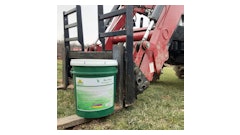
As agricultural and construction manufacturers increasingly accommodate the use of biodiesel fuels in their vehicles, components used to seal engines and transmissions against contamination and leaks must be made of tested, validated elastomeric materials that withstand unique operating conditions or they will prematurely fail, according to Joseph Walker, global director, Advanced Materials Development for Freudenberg-NOK Sealing Technologies. This message is based upon an extensive research study by Freudenberg-NOK to study how biodiesel engine oil dilutions impact common sealing elastomers. The study was launched in response to published accounts highlighting concerns associated with diluted oil in heavy machinery.
"As the large earth moving equipment and other heavy machinery becomes cleaner by using biodiesel fuels, manufacturers are going to experience more motor oil contamination in their engines from this fuel," Walker said. "Biodiesel fuels have a much higher boiling point, and the fuel is miscible with the engine oil. This means more fuel remains in the oil during use, and this diluted oil mixture impacts engine and component operation."
While industry studies that examine the impact of oil-fuel dilution on lubricants exist, this is the first time a company has undertaken efforts to understand how oil-fuel dilution affects sealing elements, he noted.
"This comprehensive study was designed to close that gap," Walker said. "We realized that if we understood how these biodiesel fuel oil mixtures impacted elastomeric materials on a molecular level, we could determine which ones would perform best and longest for our customers and require the fewest seal replacements. And the dilution of the engine oil with biodiesel fuel does have pronounced effects on both lubricant and seal life."
"The issue is particularly important in the construction industry where heavy machinery is being constantly leased and operated for long periods between maintenance cycles," said Joel Johnson, senior segment director, Mobile Machinery, Freudenberg-NOK. "By offering our customers elastomeric seals that have been specifically engineered and validated to operate flawlessly in a biodiesel fuel environment, they can be assured that their machinery will experience fewer mechanical failures and downtime due to seal issues."
"We saw a need to study how our static and dynamic seals would behave in diluted engine oil," Walker said. "What this study revealed is that there are specific grades of fluoroelastomers – those whose molecular architecture is designed for specific types of crosslinking by organic peroxides – that offer the most robust sealing solutions to issues with biodiesel blends. We already have these materials validated, tried and in use in our products. These materials are being used to design seals that will not be harmed by biodiesel fuel-oil blends and will require replacement less often."

























